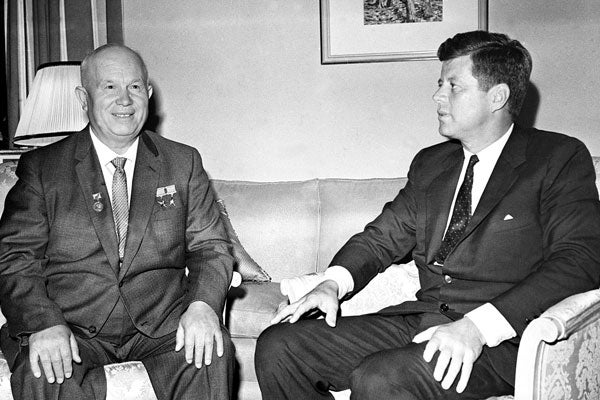50 Years Later: Lessons on Escalation from the Cuban Missile Crisis
Dean Cheng /
This year marks the 50th anniversary of the Cuban Missile Crisis, a major event in the Cold War. With the U.S. and the Soviet Union on the brink of what many feared was nuclear conflict, both President John F. Kennedy and Premier Nikita Khrushchev fumbled for a way to end the crisis without resorting to the use of force.
For the United States, and perhaps also the Soviet Union, the crisis and its resolution highlighted the importance of crisis management. In particular, it inculcated among two generations of American policymakers a concern about the potential for inadvertent escalation and accidental war. It is the rare American student of political science or modern American history who has not read Graham Allison’s Essence of Decision, a volume which notes that decisions are not made in top-down fashion with defined inputs and outputs driven by concepts of national interest, but are often the result of decisions made for narrower bureaucratic reasons. Thus, American leaders and their advisors and staffs are constantly concerned about how their actions might be perceived by their opponents, and also think about how their opponents may perceive the problem. This is not to say that American policymakers necessarily understand foreign cultures, decision-makers, or interests, but that there is at least some effort to take it into account.
What is unclear is whether the same types of considerations are at work among Asian states, and especially among decision-makers in Beijing. For most of Asia, the First World War was a distant affair, involving relatively limited forces and battles, and certainly no loss of life on the scale of the British, French, German, and Russian militaries.
Consequently, there is far less visceral fear of events leading inexorably to war. Moreover, the wars that the People’s Republic of China (PRC) has waged since 1949 have been wars of deliberate choice, whether against India (1962), Russia (1969), or Vietnam (1979). Even the Chinese intervention in Korea is not seen as “accidental.”
Moreover, Chinese views of deterrence see war-fighting as elemental to a deterrent strategy. Indeed, discussions of both nuclear and space deterrence suggest the actual use of weapons to signal resolve and to deter an opponent from further escalation—precisely the sort of activity that would be avoided if one were worried about inadvertent escalation. This is compounded by the composition and nature of the Chinese decision-making cycle, centered on the members of the Politburo Standing Committee (PSC) of the Chinese Communist Party.
In essence, key decision-makers are determined by rank in the Chinese Communist Party, not bureaucratic responsibility; thus, no foreign minister has not been a member of the PSC, or even the larger Politburo, since 2003. The Chinese consensus-based system of decision-making further complicates crisis management; this is a telex-based decision-making pace and cycle, operating in a Twitter-paced world. The bifurcation between Party and governmental positions, as well as the requirement for consensus, effectively prevents any kind of National Security Council from being forged to facilitate either rapid decision-making or even smoother information flow.
As a result, in the event of a crisis involving the U.S. and China (e.g., Spratlys, Senkakus, South China Sea, Taiwan Straits), there would be two very different mindsets on a collision course. One would be most concerned about avoiding inadvertent escalation, based upon experiences such as the Cuban Missile Crisis. The other would be more concerned about deterring what they would perceive as deliberate provocations, requiring a strong response. These two approaches would be operating on very different timeframes. The potential for misunderstanding should not be underestimated.

